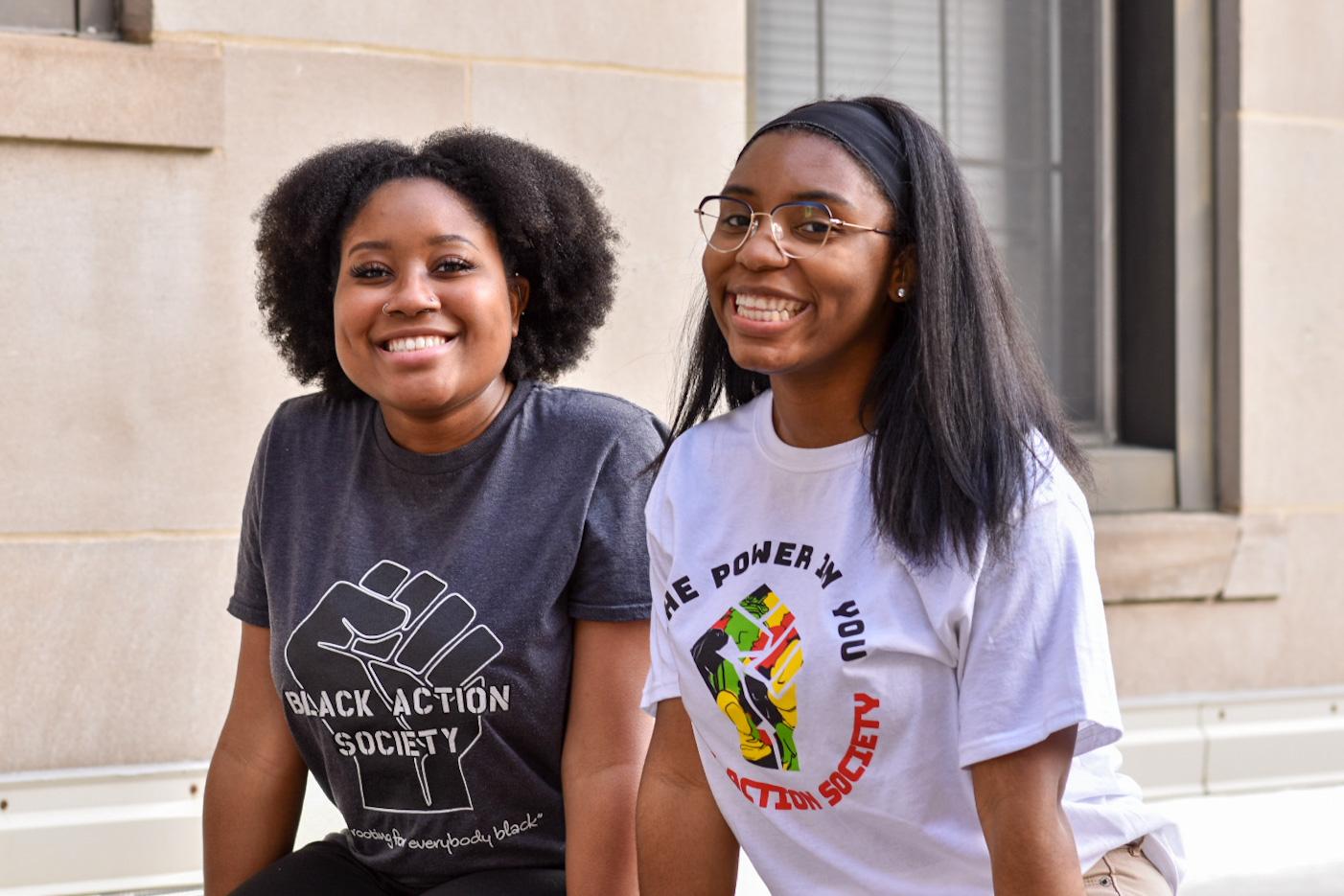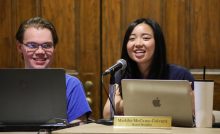The Black Action Society: Demanding Change, Then and Now


When Morgan Ottley went to the National Society of Black Engineers’ barbeque during her first year at Pitt, she was shocked.
This barbeque was not only the first time Ottley, who graduated in April and served as president of Pitt’s Black Action Society, had seen so many Black people in one place — something she missed out on in her predominately white program in high school in Laurel, Maryland — but her first glimpse into the success and multifacetedness of Black Pitt.
“My freshman year, I was like, ‘Whoa, who are all these people?’ I was so amazed by just seeing so many Black people in one space, truly,” Ottley, a neuroscience major, said. “But not just to see so many Black students in one space, but to see how multifaceted people are, especially in Black Pitt. At first glance, you wouldn’t know that kids are doing like 15 different things on campus and off campus, and are super involved in literally changing the world. Every single day.”
Throughout this year, members of BAS have led the charge in creating a more inclusive and anti-racist campus, placing Ottley and Destiny Mann, a rising senior who served as vice president of BAS last year, at the forefront of the fight. BAS is a 98-member organization that advocates for the interests of Black students on campus, and following the brutal murder of George Floyd last May at the hands of the Minneapolis police, they took this advocacy to a heightened level.
BAS and 17 other Black student organizations sent a list of more than 20 demands to the University last June. These demands included amplifying the Black student voice, increasing the number of Black students and faculty, curriculum changes, additional training for employees and Pitt police reforms. These were the largest changes BAS requested since its famous 1969 Cathedral of Learning takeover where dozens of Black students locked themselves in a computer center to demand the University improve conditions for Black students.
Many of these demands from last summer are duplicates of those from 1969 — such as increasing Black student enrollment. The University initially made progress with a peak of 14% students identifying as Black in 1979, but the percentage has fallen steeply and is now at about 5%, as of data from 2019. Ottley said in August that Pitt is “supposed to learn from history and then move on in the right direction.”
This is one reason, Ottley said, these demands are long overdue. She said Black students felt ignored by the University in the wake of Floyd’s death and similar shootings by police. So about 30 students worked long hours — through their trauma surrounding another Black person’s violent death — for about a week and a half, on top of brainstorming for around a month, to create something Ottley described as “so much bigger than us.”
“Black students were very upset, very sad, because it’s kind of just another reminder that this is how the world views us,” Ottley said. “I could walk down the street in South O, and this could happen to me. But my University doesn’t care. That’s how we felt.”
After releasing the demands, Ottley said a range of emotions went through her head — “I can’t believe we did that,” “What’s going to happen” but also “I’m most definitely going to have a target on my back.” While the reaction from Pitt and the student body was largely positive, Ottley said some of the responses to the demands — namely on social media platforms such as Reddit — were “extremely nasty.” Some of these posts included racist statements such as “‘Why can’t the Black students just be happy with what they get’ and ‘This is affirmative action at its finest,’” Ottley added. She took a break from social media soon after.
“Part of me was scared … our names are associated with this. So if I’m in public, and someone sees my name, like, I don’t know what’s going to happen to me — just the fear of a hate crime,” Ottley said. “I didn’t want us to be ostracized from the campus community, and so that was probably one of the underlying fears.”
Nearly a year later, the effect these demands have had at Pitt are unmistakable. Pitt’s Division of Student Affairs launched an Anti-racism, Diversity and Inclusion Action Plan that included in-staff service days and hiring more Black clinicians at the University Counseling Center, established meetings between BAS and senior administration, annual anti-racism training for employees as well as a new social justice website.
BAS and the Black Senate — a coalition of Black organizations on campus — gained a more public image this year as well. This included everything from University town halls with renowned author and anti-racist activist Ibram Kendi and senior Pitt administrators to even national media coverage in Black Entertainment Television.
Mann, who also served as the president of the Black Senate last year, said these opportunities helped her grow as a person — and as a leader. She said it’s also given her a “support system” and a “family” throughout her college career, especially when she moved to Pittsburgh from her predominately white hometown of York.
“I wouldn’t be the person that I am today If it wasn’t for the upperclassmen who helped me through my transition of college and who gave me that advice, who gave me the confidence to believe in myself,” Mann said. “[They] also ultimately gave me an opportunity to change this University.”
Another support system for the organization is Black Pitt alumni. Ottley said they often sought advice from alumni this year — particularly those who had been around during the computer takeover. Jack L. Daniel — who served in various leadership positions at Pitt, including vice provost for undergraduate studies and dean of students — was a founding member of BAS. He said that the group’s 1969 demands were about expanding the Black presence on campus in the wake of the Civil Rights Movement and Martin Luther King Jr.’s assasination.
“It was just a handful of Black students at the time,” Daniel, a retired distinguished service professor of communication, said. “And so the demands that were placed upon the University at that time had to do with adding to the Black student population, developing an Africana Studies department, developing the African American collection, and in general, developing a Black programmatic presence at the University.”
This wasn’t the first time Pitt had heard the demands though, according to Luddy Hayden, a Pitt alumnus and inaugural BAS member. He said the University’s response was “tepid” and doing something “a little more graphic” soon became warranted. Hayden said the knowledge that something needed to be done drove them to continue — even when they were scared.
“There was this strong focus on why all of this was happening, and that tended to override the fear,” Hayden said. “There was this sense that something was about to change, and that that change would be significant, and I think all of us who were involved in that were proud to be in that position.”
Mann said she found the takeover “inspirational” and was amazed that BAS members were “risking their futures” at such a young age. She added that she’s grateful that after the demands were released, many BAS alumni provided current students with guidance and told their perspective from when they were students.
“They’ll show the parallels between what was going on when they were students and how the same issues of what’s going on today and just providing me that advice and that foresight,” Mann said. “Because at the end of the day, we’re not reinventing the wheel — these issues aren’t new, and they’ve gone through it themselves.”
The admiration appears to go both ways — Hayden said he approved of last summer’s demands, seeing them as a necessary evolution of those from 1969.
“I think the demands that were issued over the summer were correct and on target,” Hayden said. “Times change, and as those times change, we need to change with those times, so I’m impressed with the students who continue to be active and focused and engaged.”
Ottley appreciates the importance that alumni put on the student voice throughout the planning process for this year’s demands — so much so that it’s one of her favorite memories of Daniel. At a Black Pitt at-large meeting last summer, alumni, faculty, staff and students met to discuss the current demands and chart a path forward, but Daniel pointed out that it’s largely a student-driven movement.
“I’ll never forget Jack was like y’all are talking about this and y’all are talking about that, but at the end of the day the students are really the only ones who are doing anything. Literally he was like give it up, put them at the forefront and everyone else just needs to support what they’re doing,” Ottley said. “And basically all the students on the call were feeling that way, and he kind of just said it.”
Ottley added that Daniel is honest — “He won’t spare your feelings,” she jokes. But she loves his spirit and stories about his fishing trips. Ottley meets with alumni at least four to five times per semester, but it’s sometimes much more — between the emails, text messages and calls checking in on her. While they often lend a hand on big projects like the demands, she also enjoys hearing about their Pitt experiences — the $1 movie nights, french fries from what then was The O and, of course, the Cathedral takeover.
In fact, BAS alumni were a big reason why Ottley joined the organization in the first place. Before starting her classes, Ottley attended an event hosted by the African American Alumni Council and talked with Linda Wharton Boyd — a past president of the AAAC — about the history of BAS. Ottley was quickly “amazed by her stories and by the stories of the other alumni.” During another AAAC panel, she watched the BAS president at the time speak, and the rest is history.
“I remember just listening to the president of BAS speak, and I was like, ‘I am going to be president of that organization one day,’” Ottley said. “So really everything following that spark was me kind of just figuring out how I would become president.”
Besides leading BAS — which takes up about 20 hours a week — Ottley has a lengthy resume that includes numerous clubs, a dance ensemble, her own photography business called MASO Photography and a position in Dr. Nicole Scheff’s lab at the Hillman Cancer Center studying oral cancer. Ottley was also honored as this year’s Omicron Delta Kappa Senior of the Year — which meant she gave a speech at this year’s commencement ceremony and will have her name engraved at the Cathedral of Learning walkway. After graduating, Ottley will continue her research at Scheff’s lab, while also preparing to apply to a MD/Ph.D programs. Her ultimate goal is to make major contributions in neurological cancer research and work towards dismantling inequitable disparities in patient care. Ottley hopes to one day open up her own medical practice in Trinidad — where her dad’s family is from. Mann is also involved in a number of campus activities, while working toward a double major in political science and Africana studies.
Balancing all these activities has been difficult, Ottley said, and took a toll on her mental and physical health throughout the year. “No” has become her new favorite word, Ottley added. But she often leans on her parents, who she said are her biggest inspiration and her “best friends in the whole entire world.” Her mom was even a frequent guest in Ottley’s meetings with senior administrators such as Chancellor Patrick Gallagher, Vice Provost and Dean of Students Kenyon Bonner and Provost Ann Cudd.
“I’m like, Mom, please leave my meeting. This is important,” Ottley laughed. “Like, I’m meeting with important people, and she would literally just be in the back of my meetings, like she might be cooking dinner, and just like, look up and wave.”
Ottley has also relied on her friends, many who are also leaders of Black organizations on campus. They’ve also helped her “embrace her identity” — everything from wearing her natural hair to feeling comfortable being “unapologetically Black” in various spaces. One of the most important of these friends is Mann — who Ottley calls her “little sister.” Mann will follow in Ottley’s footsteps as BAS president next year.
“I think that has been the most rewarding part of my tenure as president — getting to see Destiny grow and getting to kind of help her on her journey to becoming like who she is now has been worthwhile for me because I don’t have biological sisters, I have two brothers,” Ottley said. “And just being able to have that relationship with her for me has been more than what I asked for truly.”
This year has been long, Ottley said, and she’s often worked what amounts to “a nine to five for Pitt.” But when she graduates this year, she and the entirety of the BAS will leave the campus a different place than it was last fall. Ottley said she’s proud of the demands and the Black Senate, and, while Pitt has a long way to go, she’s excited to see what BAS and Mann do next.
“I feel like I’m going to be missing out on a lot of her achievements and goals,” Ottley said. “But even though I won’t be there physically I’ll be there every step of the way, virtually, or mentally, emotionally and always cheering her on.”
Recent Posts
SGB introduces new governing code bill and addresses rumors of ICE on campus
At its weekly meeting at Nordy’s Place on Tuesday, Student Government Board introduced an omnibus…
Opinion | School should be in the summer
Although this may be controversial, I believe that from this data, it is evident that…
Weathering the storm: Pittsburgh teams have tackled some of the toughest environments
The end of the year in western Pennsylvania is always marked by two things —…
Notes From an Average Girl // Notes on Book Banning
In this edition of Notes From an Average Girl, senior staff writer Madeline Milchman writes…
To Be Honest // Yup, it is that damn phone
In this edition of To Be Honest, staff writer Evin Verbrugge writes about her phone…
Meaning at the Movies | Portraying Toxic ‘Adolescence’
In this edition of Meaning at the Movies, staff writer Lauren Deaton explores the mini-series…

